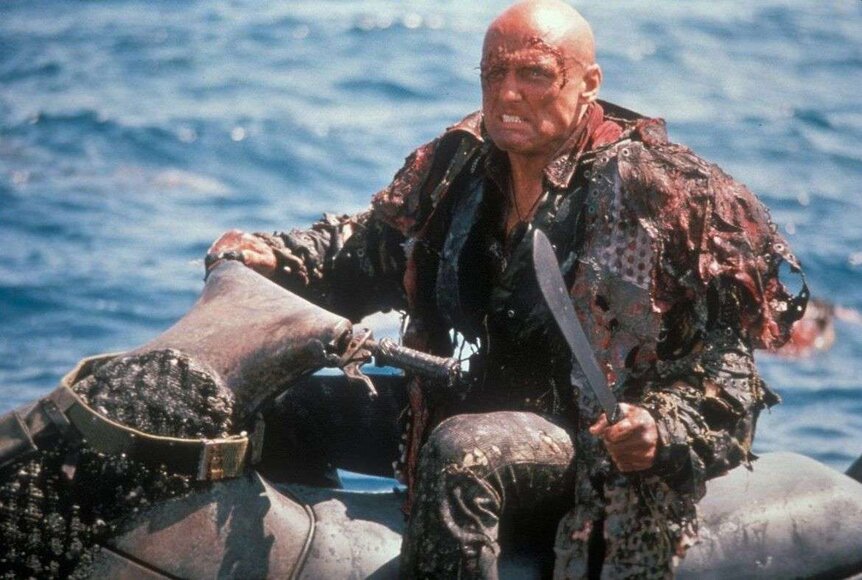Create a free profile to get unlimited access to exclusive videos, sweepstakes, and more!
This Week in Genre History: Waterworld came up for air and sank to the cold depths

Welcome to This Week in Genre History, where Tim Grierson and Will Leitch, the hosts of the Grierson & Leitch podcast, take turns looking back at the world’s greatest, craziest, most infamous genre movies on the week that they were first released.
This is going to be impossible to explain to anyone under the age of, oh, 30, but you really have to believe me: There was a time — quite a long time, actually — in which Kevin Costner was the biggest movie star in the world. Costner was the Hollywood everyman straight from central casting, able to be all things to all people: a little funny but not too funny, a little cynical but not too cynical, bland but not too bland, handsome but not too handsome.
His run from 1987 to 1992 is truly remarkable: The Untouchables, Field of Dreams, No Way Out, Bull Durham, JFK, Robin Hood, A Perfect World, Robin Hood: Prince of Thieves, and, of course, Dances With Wolves, the movie that won an Oscar for Best Picture ... over Martin Scorsese’s Goodfellas.
When you are on a hot streak like that, you are, without question, set up for a fall. And Waterworld was absolutely that fall.
Thus, this week, we look at 1995’s Waterworld, which came out on July 28, 1995. It is absolutely remarkable that the movie was made, and that a major studio bankrolled it. It’s tough to imagine something like that ever happening again.
Why was it a big deal at the time? The original idea of Waterworld, if you can believe this, was inspired by Mad Max. Specifically, the idea that you could have a post-apocalyptic landscape, except instead of long stretches of road with cars zooming down it, you’d have ... boats! You see, in the year 2500, the world is entirely made up of water, which may have been a comment on global warming and rising sea levels at first but ended up being mostly just a very difficult and expensive set to make for a motion picture. It’s always hard when you’re shooting on water.
Costner was thrilled about the project — a Mad Max-type character does sound like a lot of fun to play — and he brought on his friend and collaborator Kevin Reynolds, with whom he had made Fandango and, especially, Robin Hood, a massive hit.
Waterworld, filming in Hawaii, immediately started running into trouble. A set collapsed in a hurricane. Costner suffered injuries when he was caught in a squall. The budget ballooned to $175 million, which was the highest in Hollywood history at the time. And production got so out of control and heated that Reynolds left the project after filming was done but before it was released. It began to be known as "Kevin’s Gate," referencing the infamous Heaven’s Gate, the film that bankrupted MGM Studios in the '70s.
What was the impact? The movie’s name will forever be synonymous with “flop,” but at the end of the day it actually made back its budget, but just barely. And it’s clear everyone involved with it probably wouldn’t have gone through all the effort; the movie was mocked for its very non-Mad Max aesthetic, Costner’s ridiculous hair, his even more ridiculous “gills” — which many felt looked like ... genitalia — and just how bloated the whole exercise turned out to be.
But all told, it’s clear now the guns were out for Costner. People love a fall, and Costner was due for his. Waterworld was exactly the sort of project that results from hubris and power: a far-too-expensive vanity film, in which the star loses touch with what audiences like about him in the first place. Waterworld didn’t lose money. But it sure did end up costing a lot. Costner has had plenty of good film performances since ... but his career, clearly, has never been the same.
Has it held up? It has become fashionable to say, now, that Waterworld isn’t that bad, and that’s true: It isn’t that bad. The sets look good — for that money, they better — and there’s some wit in the action sequences. Dennis Hopper really seems to be enjoying himself, and if you look real close, you can see Jack Black looking like he very much needs a bath.
But still: The overarching takeaway from watching Waterworld in 2020 is what a waste all this is. Sure, the movie looks fine, but so what? It’s still a pretty dumb, aggressively cheesy action flick that no one thinks about other than to make fun of it anymore. It marked the end of Costner’s run as a major movie star, it almost stopped Paramount from making Titanic two years later, and it feels like the epitome of '90s excess. And yeah: The gills really do look weird.
It’s not horrible. But it’s not worth anything either. Though it does have one thing going for it: It is not The Postman, Costner’s less famous but somehow much worse vanity project from a couple of years later. It is stunning enough that this happened once. It is downright remarkable that it would happen again.
Will Leitch is the co-host of The Grierson & Leitch Podcast, where he and Tim Grierson review films old and new. Follow them on Twitter or visit their site.



























